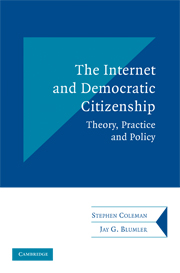Book contents
- Frontmatter
- Contents
- Acknowledgements
- Introduction: Anxiety and Optimism about Democracy
- 1 Democracy's Deliberative Deficit
- 2 A Crisis of Public Communication
- 3 From Indirect to Direct Representation
- 4 E-Democracy from Above
- 5 E-Democracy from Below
- 6 Shaping E-Democracy
- 7 Realising the Democratic Potential of the Internet
- Bibliography
- Index
- Titles in the Series
7 - Realising the Democratic Potential of the Internet
Published online by Cambridge University Press: 05 June 2012
- Frontmatter
- Contents
- Acknowledgements
- Introduction: Anxiety and Optimism about Democracy
- 1 Democracy's Deliberative Deficit
- 2 A Crisis of Public Communication
- 3 From Indirect to Direct Representation
- 4 E-Democracy from Above
- 5 E-Democracy from Below
- 6 Shaping E-Democracy
- 7 Realising the Democratic Potential of the Internet
- Bibliography
- Index
- Titles in the Series
Summary
TRANSCENDING POLITICAL DISTANCE
The premise of this book is that democracy is in trouble and the Internet possesses vulnerable potential to improve public communication. This position is in contrast to that which says that the Internet is an inherently democratising technology, so it is bound to democratise governance. Our study is rooted in the problematics of contemporary democracy. We take the view that what has gone wrong with democracy concerns its capacity to sustain mutually communicative and respecting relationships between governments and governed. A yawning chasm has grown up between those elected to represent and those who are represented which can be addressed only through strategies to shrink and transcend political distance.
For people to get closer to democracy, three things need to happen. First, democratic institutions and processes must become sensitised to the ways in which real people tell their stories and express their fears and desires. For most people, life is recorded in fragmented narratives rather than coherent speeches, in heartfelt values rather than ideological stances. Only through translation into this expressive vernacular can governance speak to humanity. Second, democracy must keep in touch with those in whose name it governs. Occasional communication when votes are needed is bound to be dismissed as cheap and cynical. The democratic conversation must be incessant if it is to be credible. Third, public interaction with the democratic process must leave its mark.
- Type
- Chapter
- Information
- The Internet and Democratic CitizenshipTheory, Practice and Policy, pp. 166 - 198Publisher: Cambridge University PressPrint publication year: 2009
- 2
- Cited by



